 Petzlover
Petzlover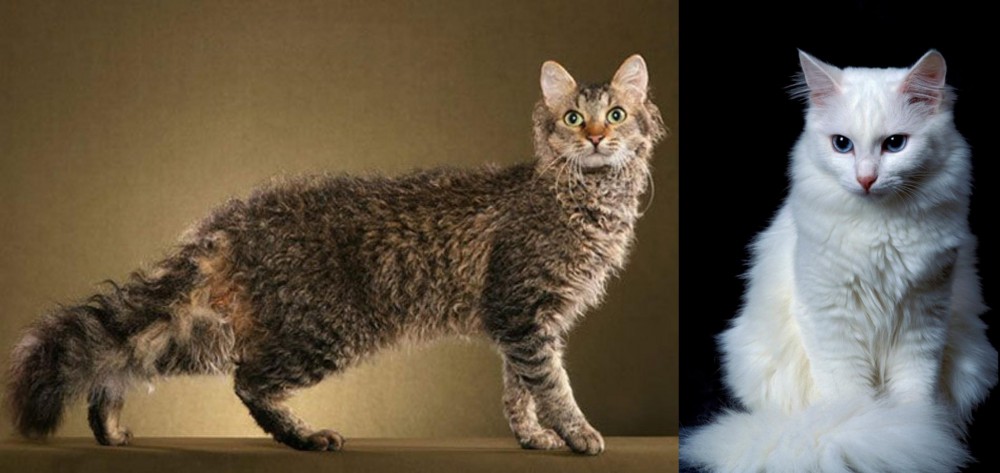 LaPerm is originated from United States but Turkish Angora is originated from Turkey. Both LaPerm and Turkish Angora are having almost same weight. LaPerm may live 3 years less than Turkish Angora. Both LaPerm and Turkish Angora has same litter size. LaPerm requires Low Maintenance. But Turkish Angora requires Moderate Maintenance
LaPerm is originated from United States but Turkish Angora is originated from Turkey. Both LaPerm and Turkish Angora are having almost same weight. LaPerm may live 3 years less than Turkish Angora. Both LaPerm and Turkish Angora has same litter size. LaPerm requires Low Maintenance. But Turkish Angora requires Moderate Maintenance
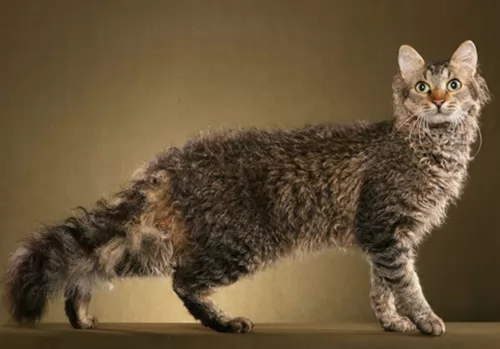 The LaPerm cat hails from the United States of America but you’ll find him in many other countries around the world.
The LaPerm cat hails from the United States of America but you’ll find him in many other countries around the world.
The cat has a dominant gene which results in the unusual curly coat of the cat. This means he is part of the rex breed. This is a term given for the naturally occurring genetic mutation that gives the cat its wavy coat.
It’s not an old cat breed this and it seems to have come about in the early 1980s for the purposes of controlling rodents. The breed founders were Linda and Richard Koehl from Oregon. They started a formal breeding program and the breed was named after their curly coat.
After the cats got the name LaPerm, it was in 2002 that they got recognition from the Cat Fanciers Association.
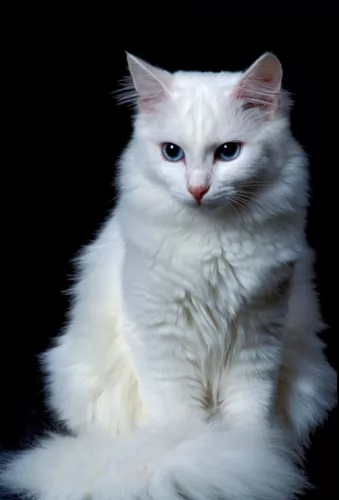 The Turkish Angora is a very old breed that naturally developed. It is thought that the breed developed in Turkey in the Ankara region formerly known as Angora.
The Turkish Angora is a very old breed that naturally developed. It is thought that the breed developed in Turkey in the Ankara region formerly known as Angora.
There are records that indicate that the Turkish Angora made an appearance in the UK as early as the 14th century already. Also, the beautiful longhaired cat was also introduced to the United States.
A breeding program was started for these cats in the early 20th century and it was then taken to Canada in 1963 and accepted as a championship breed.
While white was the only acceptable color at first, they now come in many different colors.
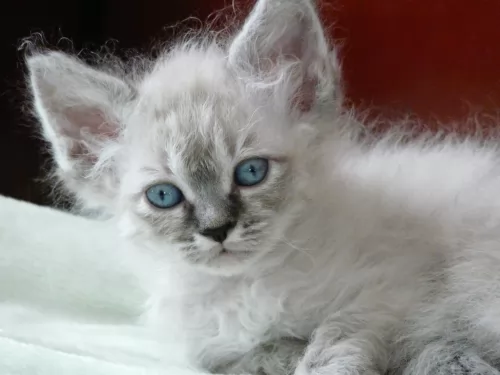 The LaPerm is a medium-sized cat that can weigh anything between 3 and 7kg. They’ve got an athletic build. The legs and the neck are fairly long.
The LaPerm is a medium-sized cat that can weigh anything between 3 and 7kg. They’ve got an athletic build. The legs and the neck are fairly long.
It is thought that they are more hypoallergenic than many other cats but no cat is truly hypoallergenic. The coat is the cat's most exceptional feature, with loose curls. The coat can be long or short. All colors and patterns are acceptable, with red, tabby, and tortoiseshell being more common.
There is no undercoat. The eyes of the cat are medium-sized and almond-shaped.
These are affectionate cats with an outgoing personality. He has a sense of humor so becomes an entertaining cat.
He gets on well with children in the home. People who have owned the cat describe him as clownish. He is playful and that means providing him with some interesting toys.
It’s an intelligent cat and learns to use his paws to open doors and tap you to take notice. He is also fairly active and will willingly retrieve small balls. He is gentle, loving, quiet, and affectionate towards his human family.
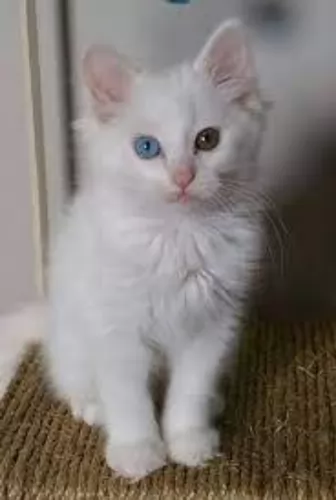 This is a medium-sized, muscular cat that can weigh between 3 and 6kg. It is a long-haired cat and the single coat has no undercoat.
This is a medium-sized, muscular cat that can weigh between 3 and 6kg. It is a long-haired cat and the single coat has no undercoat.
While the Turkish Angora is essentially white, its coat can come in a number of other colors.
The cat’s body if firm and fairly long, the legs are long with the hind legs being longer than the front legs, The tail is long and plumed, the head has large fairly pointed ears that can have tufts of fur. The eyes are large and almond-shaped and slant somewhat upwards. The color of the eyes can be blue, green, gold, amber.
This is a very active, athletic cat and he likes nothing more than to leap up on to high perches to survey his surroundings. They are intelligent, affectionate cats and they seem to gravitate towards one special human family member.
The cat is also protective of his human family. If any family member wants to stroke and pet them, they are absolutely delighted, just lapping up the attention.
They are smart enough to learn a few tricks too. They aren’t vocal cats but are sweet and quiet as well as being affectionate, making them perfect companions.
They don’t do well with changes, and a sudden change in his lifestyle can be upsetting for him.
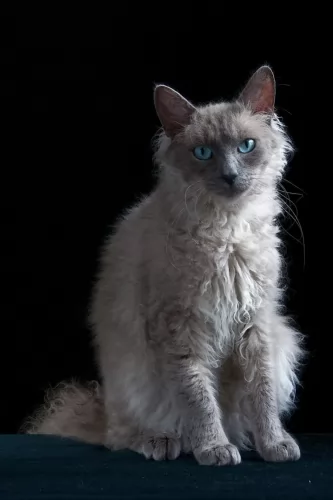 The LaPerm cat is known for its loyal, loving personality. It’s a cat that thrives on being involved with its human family and can easily turn into a lap-cat.
The LaPerm cat is known for its loyal, loving personality. It’s a cat that thrives on being involved with its human family and can easily turn into a lap-cat.
They’re active and also intelligent, and will love you to play some games with him. He will become quite vocal when he demands your attention.
Provide him with a climbing tree as he is active and loves to climb where he can survey the room and decide which human being’s lap he has in mind.
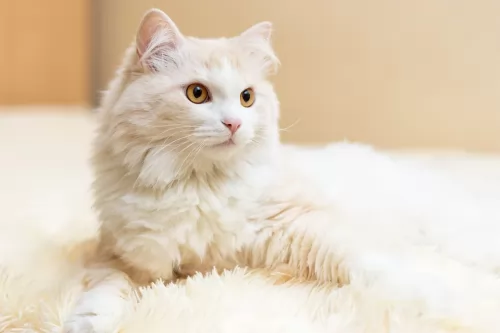 Beautiful to look at, this cat has got all the characteristics that make him a wonderful pet. He is playful well into adulthood and will love an assortment of stimulating toys to be amused by.
Beautiful to look at, this cat has got all the characteristics that make him a wonderful pet. He is playful well into adulthood and will love an assortment of stimulating toys to be amused by.
He is a sociable breed and doesn’t enjoy being left alone for hours. It would be far better to have another feline friend to keep him company.
Active and entertaining, you’ll be amused by your Turkish Angora and be so glad that you made the decision to bring such a charming creature into your home and heart.
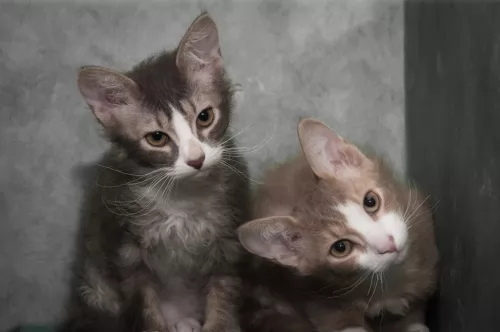 La Perms are generally healthy cats. However, any cat owner needs to recognize the signs of some of the common cat illnesses there are.
La Perms are generally healthy cats. However, any cat owner needs to recognize the signs of some of the common cat illnesses there are.
Cancer, feline immunodeficiency virus, diabetes, and heartworm are all diseases that your healthy cat can at some time succumb too.
Keep an eye on your furry friend, and if he is lethargic and no longer his happy self, get him to the vet immediately for a check-up.
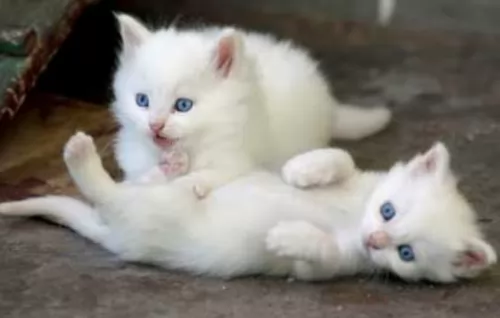 Turkish Angoras are generally healthy, but white cats with blue eyes can be prone to deafness. It is the W gene that is responsible for the white coat and blue eyes. Unfortunately, the presence of a blue eye can indicate deafness in the cat. But there are these cats that have 2 blue eyes and they have normal hearing.
Turkish Angoras are generally healthy, but white cats with blue eyes can be prone to deafness. It is the W gene that is responsible for the white coat and blue eyes. Unfortunately, the presence of a blue eye can indicate deafness in the cat. But there are these cats that have 2 blue eyes and they have normal hearing.
Another problem that has been seen in this beautiful cat breed is Ataxia which is a deadly neuromuscular disorder.
The most common sign of ataxia is an abnormal way of walking and the cat is actually unsteady on his feet. Sometimes the feet can even drag on the ground. Thankfully, screening has reduced the incidence of the disease.
Also, watch out for hypertrophic cardiomyopathy, a kind of heart disease that causes the heart muscle to enlarge.
Just remember that with a cat, diet can also play a huge role in the health of a cat. Your furry friend needs the right meaty foods with the right balance of nutrients to remain healthy and strong.
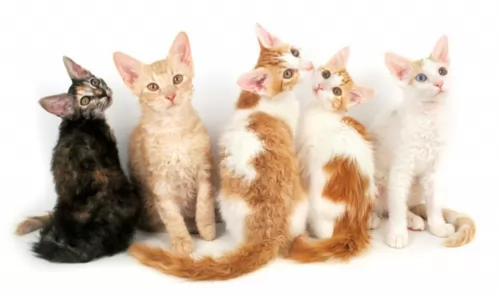 The LaPerm’s unusual coat is easy to care for as it isn’t a big shedder. You’d think that the curls would tangle but they don’t. You can gently comb or brush the curls once or twice a week. Just like with a human perm, you can mist the cat’s curls and comb and fluff them out with your fingers.
The LaPerm’s unusual coat is easy to care for as it isn’t a big shedder. You’d think that the curls would tangle but they don’t. You can gently comb or brush the curls once or twice a week. Just like with a human perm, you can mist the cat’s curls and comb and fluff them out with your fingers.
Cats are particularly prone to periodontal disease, so look into your cat’s mouth occasionally to see that the teeth are as they should be. Brushing the teeth can stress a cat out and make it miserable and the dry cat foods help to keep the teeth clean.
Pet groomers and the vet can check out the teeth for you and make sure they are in tip-top condition.
Make sure your cat’s eyes are clear and bright and free of discharge. Trim the nails as required – something the vet or the pet groomers can also do for you.
Provide your LaPerm with a litterbox and keep it spotlessly clean, ridding it regularly of the cat’s droppings.
Even though there are excellent commercial cat foods on the market, some cats develop finicky eating habits. Don’t start feeding your cat human foods and snacks to coax him to eat. It can cause a host of digestive problems.
Cats are carnivores and require foods high in protein to remain healthy. A veterinarian will need to examine your cat if he is refusing to eat and is losing weight.
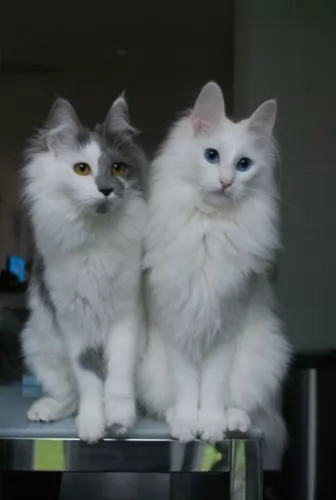 The Turkish Angora has a single coat and the lack of an undercoat makes it easy to brush him and keep the coat soft and silky. Also, the coat is only fully developed when the cat is about 2 years old.
The Turkish Angora has a single coat and the lack of an undercoat makes it easy to brush him and keep the coat soft and silky. Also, the coat is only fully developed when the cat is about 2 years old.
Check the inside of the ears. You may not want to clean them out yourself as you have to be very careful not to damage the ears. The vet and cat groomers can help you with this.
Keep your Turkish Angora’s litter box spotlessly clean. Cats are very particular about the cleanliness of their litter box and the feces will need to be removed every single day.